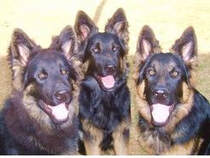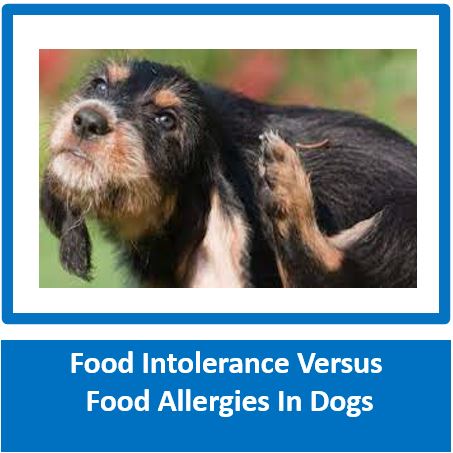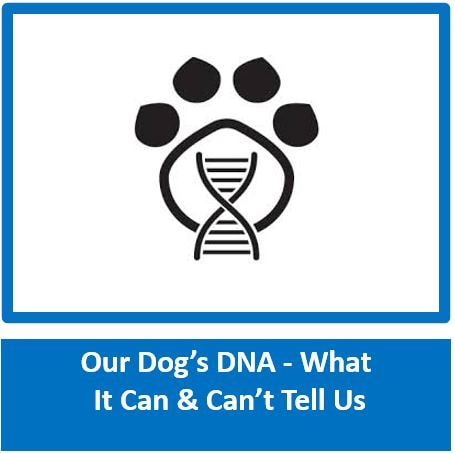|
The test was developed to measure the highest level of accuracy, approximately 100 of the most commonly known allergens that your pet may be reacting to. We test foods and environmental factors and you will also find out which popular supplements and every-day household products your pet may be allergic to. www.muttmix.co.za
|
6 Dog Breeds More Prone To Allergies + What They Tend To Be Allergic To
by Friends of the Dog
by Friends of the Dog
Virtually all dogs can be allergic to various substances, however, some breeds are more predisposed to certain allergies than other breeds. If you have a cross breed and it has developed allergies, a good idea would be to have a DNA test done, to determine exactly what the breeds are.
Although the breeds below may be predisposed to certain allergies, it may be something else that is causing the reaction, so do consider having an Allergy test done to determine what the dog is allergic too. Allergies really can become a nightmare, both for dog and owner, so if you can eliminate what is causing the problem, you are on the road to managing same.
Below are the most common dog breeds that tend to be allergic in SA and are not listed in order of tendencies for allergies.
Although the breeds below may be predisposed to certain allergies, it may be something else that is causing the reaction, so do consider having an Allergy test done to determine what the dog is allergic too. Allergies really can become a nightmare, both for dog and owner, so if you can eliminate what is causing the problem, you are on the road to managing same.
Below are the most common dog breeds that tend to be allergic in SA and are not listed in order of tendencies for allergies.
 CNI of MI Rescue
CNI of MI Rescue
Cocker Spaniel
Cockers with allergies are pretty common, and this seems to stem from them having a sensitive immune system. With some dogs the signs of symptoms tend to start between the age of 2 and 5, and get worse annually, so it is important to determine what is causing the allergy and ‘nip it in the bud’ as the saying goes. They can be allergic to food, contact dermatitis, environmental factors, and the combination of all three.
Before you try to treat the allergy yourself, do check with your vet first, as they are one of the breeds that do possess a hereditary predisposition to hypothyroidism. With dogs with this condition their metabolism may not regulate itself as it should. Dogs with this condition are predisposed to develop skin and ear infections, inflammation of the skin and also hair loss, which are often signs of allergies as well.
They are particularly prone to ‘hay fever’ allergies, just like us humans with the same culprits that affect us – dust, pollen, mould and grass, although they can be allergic to other things as well.
Cockers with allergies are pretty common, and this seems to stem from them having a sensitive immune system. With some dogs the signs of symptoms tend to start between the age of 2 and 5, and get worse annually, so it is important to determine what is causing the allergy and ‘nip it in the bud’ as the saying goes. They can be allergic to food, contact dermatitis, environmental factors, and the combination of all three.
Before you try to treat the allergy yourself, do check with your vet first, as they are one of the breeds that do possess a hereditary predisposition to hypothyroidism. With dogs with this condition their metabolism may not regulate itself as it should. Dogs with this condition are predisposed to develop skin and ear infections, inflammation of the skin and also hair loss, which are often signs of allergies as well.
They are particularly prone to ‘hay fever’ allergies, just like us humans with the same culprits that affect us – dust, pollen, mould and grass, although they can be allergic to other things as well.

Golden Retriever
The Golden is prone to a genetic condition (common to the dogs breed), called Atopic dermatitis which causes them to develop inflammation and reactions to things such as grasses, pollen, dust and mould. They can also have a more severe reaction to fleas, tics and mosquitoes. Due to their thick double coat, it is not always easy to see the condition starting, so be sure to do regular brushing and you should pick it up easier. Symptoms often start between the age of 1 – 3 years of age and will get worse annually, so early detection and treatment is your best option. They can also develop a reaction (or intolerance) to food products as well.
The Golden is prone to a genetic condition (common to the dogs breed), called Atopic dermatitis which causes them to develop inflammation and reactions to things such as grasses, pollen, dust and mould. They can also have a more severe reaction to fleas, tics and mosquitoes. Due to their thick double coat, it is not always easy to see the condition starting, so be sure to do regular brushing and you should pick it up easier. Symptoms often start between the age of 1 – 3 years of age and will get worse annually, so early detection and treatment is your best option. They can also develop a reaction (or intolerance) to food products as well.
 Carmen Leonard
Carmen Leonard
German Shepherd
Allergies in this breed can be genetic, and although they can develop environmental allergies and a reaction to insects that bite (normally the salvia is what cause the reaction, it has been found that the major type of allergy in this breed tends to be food related, especially proteins. Chicken, duck and beef tend to be the most common culprits, although, over time they may develop an intolerance to other food products such as milk, soy, eggs and wheat.
What is interesting, is that a dog that is sensitive to milk and milk related products, may not react to cheese or yogurt (plain). They may able to tolerate goats mild and cheese, simply because goat milk does not have the same lactose make up as cow’s milk, so dogs tend to tolerate it better.
Allergies in this breed can be genetic, and although they can develop environmental allergies and a reaction to insects that bite (normally the salvia is what cause the reaction, it has been found that the major type of allergy in this breed tends to be food related, especially proteins. Chicken, duck and beef tend to be the most common culprits, although, over time they may develop an intolerance to other food products such as milk, soy, eggs and wheat.
What is interesting, is that a dog that is sensitive to milk and milk related products, may not react to cheese or yogurt (plain). They may able to tolerate goats mild and cheese, simply because goat milk does not have the same lactose make up as cow’s milk, so dogs tend to tolerate it better.
 Ruth Botes
Ruth Botes
Golden Labrador
Similar to the Golden Retriever, the Lab is genetically more prone to Atopic dermatitis than other breeds. In Labs the AD is generally caused by environmental or contact allergies, such as dust, pollens, moulds. Insects may be the cause of the allergies, as mentioned above, it is the saliva that causes the reaction.
They can also have a reaction to natural or artificial flavourings, or some supplements, such as minerals and vitamins.
They are also prone to food allergies, with chicken and beef being the most common. They may also develop a reaction to eggs, soya, wheat and fish.
As with the Golden Retriever, this breed has a double coat, so skin reactions may not be picked up as easily – do bath and groom on a regular basis.
Similar to the Golden Retriever, the Lab is genetically more prone to Atopic dermatitis than other breeds. In Labs the AD is generally caused by environmental or contact allergies, such as dust, pollens, moulds. Insects may be the cause of the allergies, as mentioned above, it is the saliva that causes the reaction.
They can also have a reaction to natural or artificial flavourings, or some supplements, such as minerals and vitamins.
They are also prone to food allergies, with chicken and beef being the most common. They may also develop a reaction to eggs, soya, wheat and fish.
As with the Golden Retriever, this breed has a double coat, so skin reactions may not be picked up as easily – do bath and groom on a regular basis.
 Maltese Rescue - SA
Maltese Rescue - SA
Maltese Poodle
This breed seems to be more prone to allergies from environmental and inhalant sources such as dust, moulds, shampoo and perfumes. They can also develop allergies to insects such as flea and mosquitos, as well as allergies to the material their beds are made from
Food allergies can occur such as beef and chicken, however the Maltese tends to be sensitive to the additives and preservatives found in dog food.
This breed seems to be more prone to allergies from environmental and inhalant sources such as dust, moulds, shampoo and perfumes. They can also develop allergies to insects such as flea and mosquitos, as well as allergies to the material their beds are made from
Food allergies can occur such as beef and chicken, however the Maltese tends to be sensitive to the additives and preservatives found in dog food.
 Boxer Rescue - SA
Boxer Rescue - SA
Boxer
This breed tends to be sensitive to dog food that has a high grain content, especially those with corn or wheat in them. This breed tends to be prone to both internal and external allergens. Some of the things they may be allergic to are pollens, dust, moulds, insects such as tics, mites and fleas.
They can have reactions to household products that are used on carpeting, bed sheets, the shampoo used.
They can be on the same food for a long period of time before showing allergies to something in the food, especially any foods with a high grain content, as mentioned above.
General
If you suspect your dog of having an intolerance or allergic reaction to anything, please do check with your vet first and foremost, and as above, having an allergy test done, can help you to solve what is responsible. The sooner any intolerance or allergy is attended too, the higher the chance of preventing it getting worse – allergies can make both a dogs and owners life an absolute misery.
This breed tends to be sensitive to dog food that has a high grain content, especially those with corn or wheat in them. This breed tends to be prone to both internal and external allergens. Some of the things they may be allergic to are pollens, dust, moulds, insects such as tics, mites and fleas.
They can have reactions to household products that are used on carpeting, bed sheets, the shampoo used.
They can be on the same food for a long period of time before showing allergies to something in the food, especially any foods with a high grain content, as mentioned above.
General
If you suspect your dog of having an intolerance or allergic reaction to anything, please do check with your vet first and foremost, and as above, having an allergy test done, can help you to solve what is responsible. The sooner any intolerance or allergy is attended too, the higher the chance of preventing it getting worse – allergies can make both a dogs and owners life an absolute misery.





